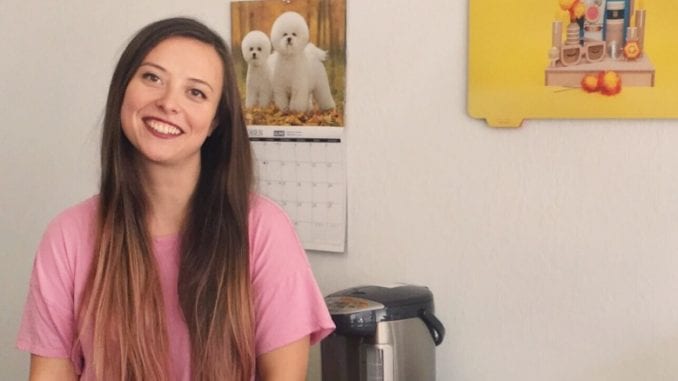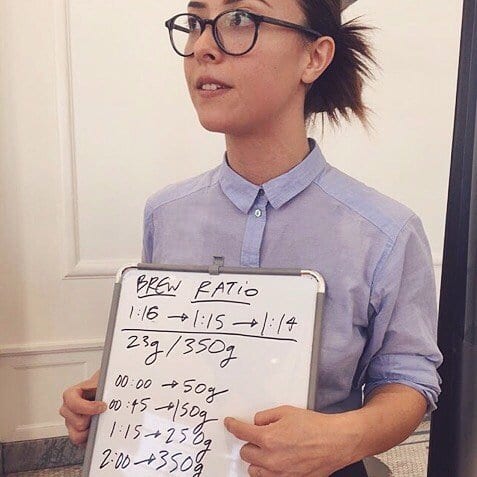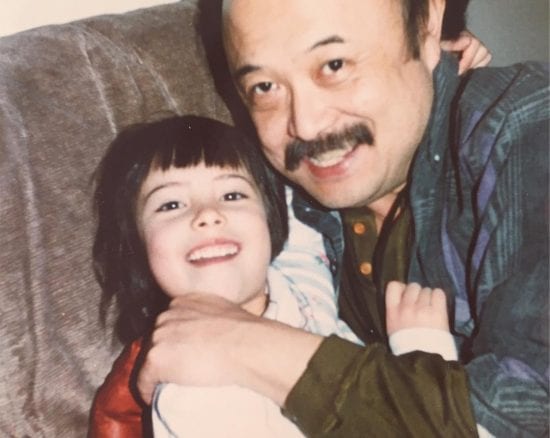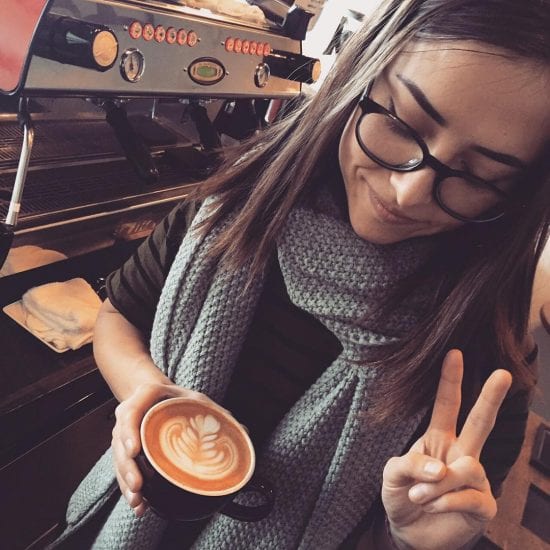
Umeko Motoyoshi wants to make you the best cup of instant coffee you’ve ever had. In this two-part article, we talk to her about her coffee beginnings, how her father influenced her love of service, and how failure has helped shape her.
BY ASHLEY RODRIGUEZ
BARISTA MAGAZINE ONLINE
Photos courtesy of Umeko Motoyoshi
Umeko Motoyoshi is the head of coffee for Sudden Coffee in San Francisco, an instant coffee company focused on quality and accessibility. In part one of our interview with her, she describes the importance of kindness and covers some of the pivotal moments in her coffee career.
Ashley Rodriguez: Tell us about your coffee background.
Umeko Motoyoshi: I fell in love with specialty coffee right out of high school. At the tea shop where I worked, we got an espresso machine and David Schomer’s training DVD. And that was kind of it for me—I just never stopped making coffee. I tried to go to school and I dropped out because I just wanted to make coffee. It was all I really cared about.
I worked as a barista, I managed cafés, I learned how to work on espresso machines. Eventually I moved from Seattle to the Bay Area, and led Four Barrel’s training department. Then I worked for Blue Bottle Coffee, and I learned a lot from them about hospitality. I started working part time at Sudden Coffee, when the coffee was still made with espresso shots we pulled by hand.

I would come in two days a week and just pull 900 espresso shots. And they were like, “Well, you’re pretty good at making espresso—do you want to hack commercial instant coffee processes?” I was like, “That seems like a stretch but I’ll do my best,” and joined full time.
AR: How has your family/background influenced your approach to coffee?
UM: My father was a Japanese tea ceremony master. So I grew up around the idea that it can mean so much to serve someone a drink. It can contain so much meaning and be so special. At the same time, my dad wanted everyone to feel comfortable, and he didn’t take himself too seriously. He often gave lectures on the tea ceremony, and he always would make this joke:
He’d get up in front of everyone, wearing his tea robe, looking solemn, and he’d wordlessly stare around the room at everyone. Then he’d say, “I’m going to tell you how you perform a tea ceremony.”
Everyone would fall silent and he’d pause really dramatically.
Finally, he’d say, “You boil water. And you make the tea.”

Then he’d start cracking up. And the audience would be confused at first, then everyone else would start chuckling and the tension would melt. His point was that, although the ritual is beautiful, the important part is just making something hot to drink. The tea, the act of service, does not need ceremony in order to be special. It’s inherently special. And it’s inherently simple.
Over time, I’ve found myself aligning more and more with that. I keep moving away from ceremony and seriousness, which used to hold a lot of meaning for me. But I don’t need it now to make my work feel valid. Because I think it is inherently special to make and serve coffee. I get to do something that makes someone’s day a little better or a little easier, and it’s awesome. I don’t need it to be more than that, because I think that in itself is already amazing.
AR: You speak about kindness in coffee. What does that mean to you? How does it influence your approach to serving coffee?
UM: I think of kindness as a skillset. It’s not, for me, an effortless state of being or something that you just achieve and then say, “OK, I’m kind now.” It means the ongoing work and action of considering the emotional impact of your decisions. Sometimes it’s complex—you have to weigh a lot of different impacts experienced by different stakeholders. Sometimes it’s much more simple.
At Sudden, a lot of our work is in thinking through the emotional impact of our product. And for us, the first order of business is our company culture. We need emotional capacity to do emotional work. So we feel it’s crucial to build toward a safe and supportive work environment. We prioritize team health and happiness, and we value taking concrete actions to constantly improve this.

From there, we’re able to work on what we’re passionate about—making our customers happy! We directly ask our customers what they think and how they feel about things. Then we draw on our experience in coffee, packaging, operations, tech, etc.—to meet our customers in new and unexpected ways.
This is an intentional move away from how I grew up in specialty coffee, where the focus was really flipped. Rather than thinking about how our customers feel, we thought about how we, the coffee companies, feel. How we can get customers to meet us where we’re at. There was this idea that we needed to change people’s minds, habits, and values to match ours.
But it feels better to me to approach quality through the lens of what makes people happy. And by that I mean what they directly tell us, not just what I assume! For me, coffee is good when the customer enjoys it and there is integrity in the supply chain. I build quality around that. So that’s how we think through our impact, and that’s what we work toward continually improving.

AR: What have been some of the most pivotal moments for you in your coffee career?
UM: Losing at a barista competition was really important for me. I had been so risk averse my whole life, because I didn’t want anyone to see me mess up. So I finally took that risk, and it was worth it—not because I won but because I lost. Like publicly, objectively, I did not make the cut. I worked so hard, and it meant so much to me—and I still didn’t place. And I got to see for myself that I could fail and still be OK, and my friends and family and co-workers still loved me. And I still loved me, too! The experience made me feel much more confident about taking risks.
Another really pivotal moment was getting my Q-Grader license. I had always thought I couldn’t do it, that I wasn’t qualified or good enough to do something like that. So first of all, it was really empowering when I started at Sudden, and both of my bosses were like, “Oh yeah, totally go do it. You’re gonna crush it.” And then actually showing up and taking the course was such a transformative experience. I realized—hey, this is totally doable for me. I am qualified. I am good enough, and I belong in the room. Sometimes I still get really bad “imposter syndrome,” where I feel like I’m really not as good as everyone else. And in those moments I’ll be like, “Whatever, I passed the sweet-salt-sour modalities test and that was hard!” Maybe it sounds funny, but it honestly helps snap me out of it.
Look out tomorrow for part two of our interview with Umeko!

